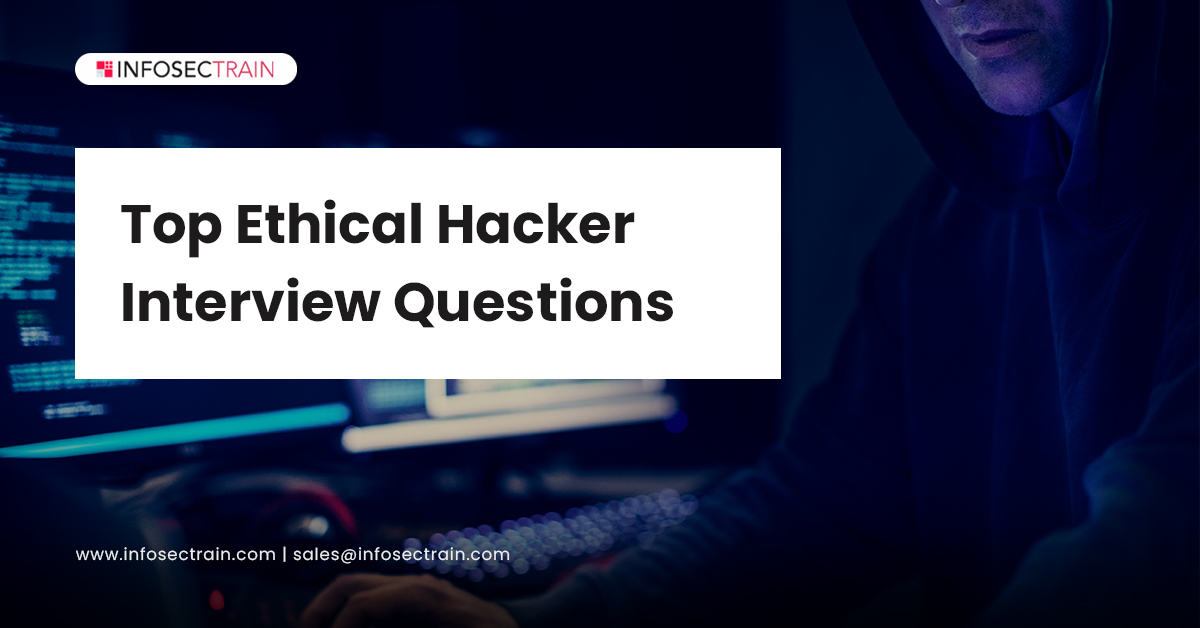Top 20 Interview Questions Asked to an Ethical Hacker
An ethical hacker assists an organization in securing data and valuable information. They usually do this by performing penetration testing and breaking into the network of the authorized organization and bringing them to notice all the vulnerabilities and loopholes in the system. This way the highlighted flaws can be fixed before a malicious hacker can exploit them.

Due to the growing cyber crimes and hacking events, ethical hackers are in high demand and fairly compensated in the corporate world. You’re on the right page if you are planning to build a career in this field. We have a list of the top 20 questions that are asked to an ethical hacker in the interview.
1. Define ethical hacking?
Ethical hacking is when a person is permitted to hack a system with the product owner’s consent in order to identify and repair flaws in the system.
2. What are the various types of ethical hacking?
There are several types of hacking, like:
- Computer Hacking
- Password Hacking
- Website Hacking
- Network Hacking
- Email Hacking
3. What exactly is a Brute Force Attack?
Brute force attacking is a method of cracking passwords and gaining access to the system. The hacker attempts to break the password by using all conceivable combinations of letters, numbers, special characters, and small and capital letters. It employs tools such as ‘Hydra.’
4. What are some of the most often used tools among ethical hackers?
- Meta Sploit
- Wire Shark
- NMAP
- John The Ripper
- Maltego
5. What sorts of ethical hackers are there?
There are various types of ethical hackers:
- Grey Box hackers or Cyber warrior
- Black Box penetration Testers
- White Box Penetration Testers
- Certified Ethical hacker
6. What is SQL injection, and how does it work?
SQL injection, often known as SQLI, is a typical attack vector in which malicious SQL code is used to manipulate backend databases and get access to data that was not intended to be shown. This data might encompass everything from sensitive corporate data to user lists to private consumer information.
7. What are the different sorts of social engineering assaults that use computers? What is the definition of phishing?
Computer-assisted social engineering assaults are on the rise.
- Phishing
- Baiting
- Online scams
Phishing is a method that includes impersonating a legitimate system by sending fake emails, chats, or websites in order to steal information from the original website.
8. What is Network Sniffing and how does it work?
Data traveling over computer network links are monitored by a network sniffer. The sniffer tool can assist you in locating network problems by allowing you to capture and view packet-level data on your network. Sniffers may be used to both steal information from a network and administer a network legitimately.
9. What is ARP spoofing or ARP poisoning?
ARP (Address Resolution Protocol) is a type of attack in which an attacker modifies the target computer’s MAC (Media Access Control) address and assaults an internet LAN by injecting forged ARP request and reply packets into the target computer’s ARP cache.
10. What is the difference between Pharming and Defacement?
Pharming: In this approach, the attacker hacks DNS (Domain Name System) servers or the user’s computer, redirecting traffic to a malicious website.
Defacement: The attacker replaces the organization’s website with a different one using this approach. It includes the hacker’s name, pictures, and maybe even messages and music.
11. What is the definition of enumeration?
The extraction of a system’s machine name, user names, network resources, shares, and services is called Enumeration. Enumeration techniques are used in an intranet environment.
12. What are the different types of ethical hacking enumerations?
The following are the many enumerations accessible in ethical hacking:
- DNS enumeration
- NTP enumeration
- SNMP enumeration
- Linux/Windows enumeration
- SMB enumeration
13. What exactly is NTP?
NTP (Network Time Protocol) is used to synchronize the clocks of networked computers. UDP port 123 is utilized as the primary mode of communication for the server. NTP can keep time to within 10 milliseconds across the internet.
14. What exactly is MIB?
MIB stands for Management Information Base, and it is a type of virtual database. It offers a formal definition of all network objects that may be handled with SNMP. The MIB database is hierarchical, with Object Identifiers (OID) used to address each managed item.
15. What are the different kinds of password cracking techniques?
There are several different sorts of password cracking techniques:
- Brute Force Attack
- Hybrid Attack
- Syllable Attack
- Rule-Based Attack
16. What are the different stages of hacking?
The various stages of hacking are as follows:
- Reconnaissance
- Scanning
- Gaining Access
- Maintaining Access
- Clearing Tracks
17. How can one protect himself from being hacked?
Yes, a computer system or network may be secured against hacking by following these approaches:
- Updating the operating systems for security updates
- Formatting any device intended to sell
- Securing the Wi-Fi with a strong password
- Using memorable and tough security answers
- Emailing via a trusted source
- Not storing any sensitive information on cloud
18. What is CSRF (Cross-Site Request Forgery) and how does it work? What can you do to avoid this?
Cross-Site Request Forgery, often known as CSRF, is an attack in which a malicious website sends a request to a web application that a user has already authenticated against on another website. To avoid CSRF, attach a random challenge token to each request and link it to the user’s session. It assures the developer that the request is coming from a legitimate source. For example, a person is signed in to their online banking platform, which has a low level of security, and by clicking a “download” button on an untrustworthy site, it maliciously makes a money transfer request on their behalf through their current online banking session. Without your express authorization, compromised sites can divulge information or conduct acts as authorized users.
19. How will you differentiate between an IP and a Mac address?
IP address: An IP address is assigned to each device. An IP address is a number assigned to a network connection.
MAC address: A MAC address is a one-of-a-kind serial identifier issued to each network interface on a device.
The main difference is that a MAC address uniquely identifies a device that wishes to join a network, whereas an IP address uniquely specifies a network connection with a device’s interface.
20. What exactly do you mean when you say “keystroke logging”?
Keystroke logging, often known as keylogging or keyboard capture, is a method of recording keystrokes. It’s a sort of surveillance software that captures every keystroke on the keyboard. Every keystroke is recorded, and data is accessed by using the logging application.
CEH with InfosecTrain
Certified Ethical Hackers are in great demand in the market as a result of their extensive use. Join InfosecTrain, the premier training provider that will expose you to unique difficulties, to take the first step towards being certified. We are one of the most well-known training companies in the world. Our highly trained and certified trainers create a comprehensive action plan and guide you through the process of establishing a solid foundation and advancing your knowledge to a professional level. Infosec Train’s CEH v11 Online Training & Certification Course can help you have a deeper understanding of the subject.







 1800-843-7890 (India)
1800-843-7890 (India)